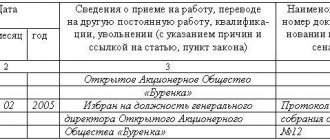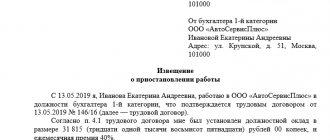Before finally hiring a new employee, most employers first offer him to undergo a probationary period. This period is difficult not only for the employee, but also, to some extent, for the management of the organization. How to arrange a probationary period, how much to pay for it, how to fire an employee if he failed to cope with the assigned functions - the employer faces quite a lot of questions. Let's look at this issue in more detail.
Is there a probationary period for people with disabilities when hiring?
What is the essence of a probationary period and why is it needed?
The probationary period is the time when an applicant for a position has not yet been finally accepted into the company’s staff, but has already begun to perform work tasks. The purpose of the test for the employer is to check how well the employee matches the vacancy in terms of his work skills and abilities, and to make sure that he is suitable for the team in terms of personal qualities. For the applicant, the probationary period is also important - he can understand in a short time whether he is able to cope with the assigned tasks and whether the work meets his expectations.
Are there any specifics to laying off an employee during a probationary period ?
Attention! It is illegal to allow an employee to work without concluding an employment contract with him, even if we are talking only about a probationary period.
The law requires that the fact of employment, even during the probationary period, be documented. Otherwise, the employer will face administrative liability and large fines.
How to justify it correctly
There is a misconception among employers that during the entire probationary period it is permissible to simply dismiss an employee without giving any reasons, simply because he was “not suitable.” This is completely incorrect, and this action can be protested by the employee in court, and the employee himself, by a court decision, can be reinstated in his job.
To avoid such problems, it is necessary to prepare thoroughly for the possible dismissal of employees who have not completed the probationary period. The following documents can serve as confirmation of the legality of dismissal:
- memos from the immediate supervisor;
- acts on the release of low-quality products;
- complaints from colleagues and clients;
- explanatory notes from the employee on facts of failure to complete tasks or violation of labor discipline rules;
- various disciplinary sanctions;
- reviews, characteristics of managers, mentors responsible for completing the probationary period.
Naturally, it is not at all necessary to have all the above documents, but it is advisable to prepare at least several such evidence of dishonest or unskilled work.
If the employer subsequently decides to retain the employee to continue cooperation, these documents simply will not be needed. But their presence makes claims against the employee much more significant.
If an employer decides to dismiss someone who has not completed the probationary period, they must be notified in writing of the upcoming dismissal 3 working days in advance. The notice of dismissal is drawn up in 2 copies; upon delivery, the employee must put the date and personal signature on the employer’s copy. If the employee refuses to confirm the fact of receipt of the notice, then a corresponding entry is made about delivery on a copy of the notice, which must be confirmed in writing by two witnesses.
Next, the manager issues a dismissal order with appropriate wording.
The work book also records dismissal due to unsatisfactory results of the probationary period. The work book is issued to the dismissed employee with a personal signature on the last working day, if he is present at work on that day. If he is absent, on the same day you should send him a notification by registered mail about the need to obtain a work book, so the employer will protect himself from possible claims about the untimely issued work book.
How to open your own transport company? All the details about this popular business are given in the article.
The employee must also receive the final payment on the last working day. And in his absence - the next day after applying for payment.
It should be remembered that no severance pay is provided upon dismissal without completing the probationary period.
It can also be noted that during the probationary period, the employee has the same rights as the employer, that is, he can quit by notifying the employer 3 days in advance if he decides that the working conditions do not suit him.
Despite the fact that formalizing the resignation of an employee during an internship is easier than starting the dismissal procedure after a probationary period, it is clear that this action requires carefully prepared documents and additional time and effort on the part of the employer. Meanwhile, many employees, understanding the employer’s intention to fire them under Article 71 of the Labor Code of the Russian Federation, are often ready to compromise and terminate the employment contract by agreement of the parties, which is much less labor-intensive for the employer and often saves him a lot of nerves.
Documentation of the probationary period
As soon as an employee begins to perform his job duties, he is considered to have already been hired. Even if it is just a probationary period and even if there are no written contractual obligations with it.
However, in order to avoid disagreements with the law, the employer should take care of the documentary side of the probationary employment in advance. In particular, the main document regulating the relationship between the organization and the employee for the period of inspection is the employment contract . At the same time, it must certainly contain a section on the probationary period with a clearly defined period and its conditions.
How to dismiss an employee at his own request during the probationary period ?
In situations where an employee begins to work without drawing up an employment contract, a separate agreement on a probationary period must be concluded with him in advance, which will subsequently be included in the employment contract.
For your information! If a person started working without a written employment contract or the employment contract does not stipulate a probationary period, the law regards this as the employer hiring the employee without passing a test. Verbal agreements have no meaning.
Possible reasons for dismissal
If the initiative to terminate relations with the enterprise during the trial period comes from the employee, then the reasons may be different; the citizen is not obliged to report them in the notification; the standard wording “at his own request” is sufficient. An employee may, in accordance with Art. 71 of the Labor Code of the Russian Federation, decide that the job is simply not suitable for him. Moreover, the employee can express such a desire at any time during the trial period; it is not necessary to undergo the entire test. for example all three months. The employer also has the right to take the initiative and carry out dismissal, but he will need to have really compelling reasons. Otherwise, the dismissal may be considered illegal.
The reasons for dismissal during the probationary period at the initiative of the employer may be the following:
- absenteeism, that is, absence from work for more than four hours in a row;
- failure to comply with established labor discipline (divulging secrets, appearing drunk, etc.);
- unprofessional behavior (committing an immoral act, etc.);
- committing an offense at the place of work (theft, embezzlement, damage or destruction of property, etc.).
All these reasons are indicated in Art. 81 of the Labor Code of the Russian Federation, but the employer may respond to such misconduct with other disciplinary punishment or even limit it to a warning (for example, if there are good reasons for absenteeism). The grounds for dismissal must be documented, an explanation must be requested from the employee, and a commission must be created to investigate the case. Also, if an unsatisfactory result of passing the probationary period is revealed, the employer is obliged to prove the identified incompetence of the employee. Thus, it is necessary in the employment contract, when formulating the test, to initially indicate what specific duties the employee must perform, to what extent, etc., so that subsequently the result of completing the probationary period can be reliably and accurately determined.
Due to unsatisfactory results of completing the probationary period, dismissal may take place before the expiration of 3 months. The legislator does not oblige the employer to wait until the end of the maximum probationary period established in the Labor Code of the Russian Federation, but there must be evidence of the employee’s inadequacy for the position or performance of work of inadequate quality.
Registration of a probationary period in a work book: to write or not
The question of whether it is necessary to make an entry about the probationary period in the work book interests many employers.
The law clearly establishes that there is no need to mention a probationary period in the work book; only a record of hiring is made in it, and from the date on which the employee began performing work duties in the verification mode.
The employer must make all the necessary entries in the work book of each employee who has worked for him for more than 5 days, but only if this is a permanent place of work for the person.
How to draw up an employment contract with a probationary period ?
Thus, the condition of the probationary period is fixed only in the employment contract.
Sick leave
Article 70 of the Labor Code of the Russian Federation establishes that, under a concluded contract, a specialist is required to pay for sick leave according to established standards. It happens that the management of an enterprise enters into a contract with a specialist for the provision of paid services, when only the work performed is paid for. In this case, there is no question of paying sick leave.
A manager cannot fire a subordinate while he is absent due to temporary incapacity due to vacation or illness.
For your information:
If the probationary period has expired while the specialist was not at work for some period of time for a valid reason, then the probationary period is extended by the amount of time that the employee was absent.
Duration of probationary period
The probationary period cannot be endless and the Labor Code clearly establishes a time limit for checking the suitability of a new employee for the position held - three months, that is, 90 calendar days . After the three-month period, the employer must decide whether he is satisfied with the person or whether it is better to part with him.
But there are exceptions :
- Employees who have entered into an employment contract for a period of 2 to 6 months, as well as those employees who are engaged in seasonal work, are entitled to undergo testing for no more than two weeks;
- Executive employees, for example, directors of organizations, branches and structural divisions, and their deputies, as well as chief accountants and their deputies, can be tested for 6 months;
- officials hired for the first time in the civil service or who have moved from one position to another must work in a probationary mode in a new place for 3 to 6 months.
Important! After making sure that the new employee is completely satisfied with him, the employer can shorten the probationary period. But he has no right to renew it under any circumstances.
It should be remembered that there are certain periods of time that cannot be included in the test period. For example, if:
- the employee was on sick leave;
- was engaged in public or government duties;
- went on short leave without salary;
- was on vacation due to training;
- was actually absent from work for any other valid reasons.
Attention! The probationary period must be included in the length of service, giving him the future right to planned paid annual leave.
Results
If an employee has not completed the probationary period, every employer should know how to fire him without breaking the law. There may be slightly more grounds for dismissal during a probationary period than with the usual termination of a full-time employee’s contract at the initiative of the employer. However, the amount of payments may be less. The employee also has the right to quit if the new place and working conditions are not suitable for him, without undergoing mandatory work for a period of 2 weeks.
However, do not forget about the length of the probationary period, after which you will have to terminate the employment contract on a general basis.
You can find more complete information on the topic in ConsultantPlus. Free trial access to the system for 2 days.
Payment for the probationary period
By law, work during the probationary period must be paid by the employer, and in exactly the same way as if the employee was already on staff on a permanent basis.
The legislator explains this requirement simply: since work is performed in these two cases equally and in equal importance, then infringement of the rights of an employee on probation will be considered a violation of the law.
How is the probationary period by an employee?
However, employers are not always ready to put up with this state of affairs and quite often circumvent this rule. And they do it quite legally too. For example, for the period of a probationary period, an employment contract may be concluded with an employee with a salary specified in it, as if permanent. After passing the test, this employment contract is terminated by mutual consent of the parties and a new one is concluded with a higher salary. Another way: payment of bonuses and additional payments to the organization, depending on the length of service in it.
Is work needed?
Having decided to resign during the probationary period, the employee submits a corresponding application three days in advance. These three days from the date of application are the working days. This period is determined by Article 71 of the Labor Code.
Important
The working time can be reduced, but in no case increased. Therefore, the boss’s demands to work for two weeks are considered unlawful.
There may be no work at all if both parties agree on this. By mutual agreement of the parties, the employee may be released immediately. A specialist may also not work if he leaves work for a good reason, for example, when leaving for another place of residence or due to retirement.
Who has the right not to undergo probation?
There are certain categories of employees who are not required to pass a test when hired. These include:
- women who are expecting a child and have children under three years of age;
- minors;
- those who are transferred from one organization to another by agreement between employers;
- employees appointed to a position after passing a competition in the manner prescribed by law;
- employees under an employment contract valid for up to two months;
- other persons prescribed in the Labor Code of the Russian Federation.
What to do if a new employee fails the probationary period
If during the testing process it turns out that the employee is not suitable for performing the tasks assigned to his job duties, the management of the enterprise can fire him. Moreover, this must be done during the test period , or, in extreme cases, on its last day. Otherwise, the employee will be considered to have successfully completed the test.
Important! During the probationary period, the employer should closely monitor how the employee completes the tasks given to him. If they are untimely or of poor quality, this must be recorded (for example, in official memos and memos). In the future, if events develop unfavorably, scrupulous documentary support of the test will facilitate the collection of evidence to justify the dismissal of an employee who failed the test.
The employee must be notified of the impending dismissal at least three days in writing. The notification must necessarily indicate the reasons why it is believed that the employee did not pass the test, as well as attach documents confirming them.
To summarize, we can draw the following conclusion: the probationary period is the time when, despite particularly close attention from the employer, the new employee has all the rights and responsibilities of employees on a permanent basis. You need to approach the registration of a probationary period in strict accordance with the requirements of the law - this will allow you to avoid claims in the future, both from the staff and from the controlling structures.
The court is on the side of the law
Thus, the procedure for dismissing a person who has not completed the probationary period is simple. However, this tool should not be abused, since initially the court always sides with the employee, as less protected than the employer. And if there is even the slightest reason to suspect that the employer has falsified the evidence, then we can guarantee that the court will support the employee, that is, reinstate him in his position with all the ensuing consequences from this situation.
Therefore, if there are no real reasons to say that the employee did not cope with the test, but you want to fire him, it is better to come to an agreement with the employee and terminate the employment relationship by agreement of the parties. In this case, your nerves will be intact and the company’s reputation will not suffer.







